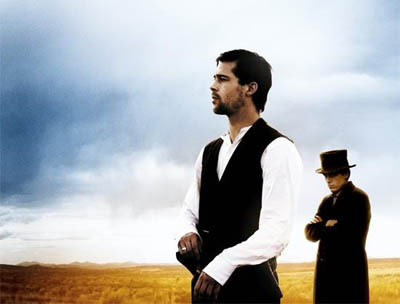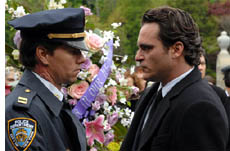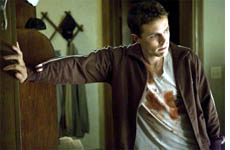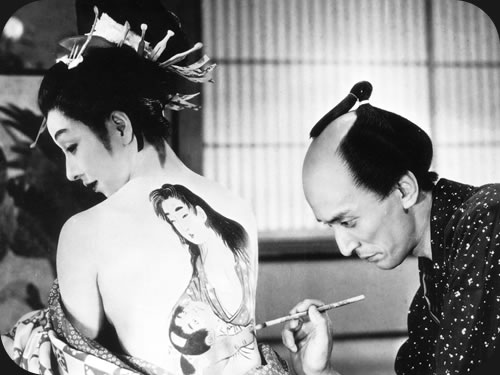You may own the night, but I’ve got a lien on midday
Saturday | November 10, 2007 open printable version
open printable version

DB here:
Since I retired, I usually go to matinee shows. It’s cheaper, and the auditorium is depopulated. Sometimes I’m the only person there. I know, movies are supposed to be seen with a big audience; but I’ve seldom liked the experience of a packed house. Does the humble worshipper in the temple need a congregation to confirm his faith? Isn’t it best to commune with the deity alone? More to the point: Even before the advent of cellphones, somebody always coughs or talks at the wrong time.
If there are any other people around during my matinees, they are likely to be elderly folks, misfits, losers, idlers, and troublemakers. This makes me feel superior. But then I realize that to an objective observer, I could fit into any of those categories. Last time I went to my local, the cashier at the ticket stand gave me the Senior Citizens discount automatically. The pleasure of saving a dollar was small compensation for the blow to baby-boomer pride—sort of the reverse of being carded at a bar when you’re 30.
Curiously, as film attendance is dropping, multiplexes are offering more screenings. I enjoyed the idea of starting the screening cycle at noon or so, but now some ‘plexes start running as early as 10:30. At my neighborhood ‘plex, you can attend the Baby Box Office (“The lights are a little brighter, the sound a little softer”) on Tuesdays at 10:00 AM. It’s currently featuring the ideal picture for babes in arms, American Gangster.
Here are some jotted opinions on movies seen at midday over the last couple of weeks.
 We Own the Night: I admired James Gray’s The Yards, but this seemed to me quite standard. One brother’s a cop, the other’s on the shady side: back to Warner Bros. of the 1930s. (Where’s the tough priest, though?) Although set in the 1980s, it looks a bit like a 1970s movie, with all those long-lens shots and flattened color values. The plot was by-the-numbers, and lines like “You’re a dead man” and “I love you very much” don’t help. I guess it’s a “personal” project for Phoenix and Wahlberg, both brave performers in other vehicles but mostly going through the motions here. Further evidence that today’s cinema is classic studio cinema, with more sex, violence, drugs, and rock-and-roll.
We Own the Night: I admired James Gray’s The Yards, but this seemed to me quite standard. One brother’s a cop, the other’s on the shady side: back to Warner Bros. of the 1930s. (Where’s the tough priest, though?) Although set in the 1980s, it looks a bit like a 1970s movie, with all those long-lens shots and flattened color values. The plot was by-the-numbers, and lines like “You’re a dead man” and “I love you very much” don’t help. I guess it’s a “personal” project for Phoenix and Wahlberg, both brave performers in other vehicles but mostly going through the motions here. Further evidence that today’s cinema is classic studio cinema, with more sex, violence, drugs, and rock-and-roll.

Gone Baby Gone: At least We Own the Night doesn’t promise to be more than a typical genre piece. For several years now, many ambitious or “prestige” pictures have given genres the uplift treatment, making them—well, serious. So a crime thriller that might have been trim at 90 minutes gets padded out to portentous dimensions, chiefly through scenery-gobbling performances and tricky narration. A recent model is The Departed, but Mystic River also worked this ground.
Such is Gone Baby Gone, another Lehane exercise in male pain in a gritty ethnic enclave. Director Ben Affleck shoots it in a standard way, with long-lens glimpses of homely people sitting on stoops (don’t get too close), and he resorts to the now-common device of flashbacks that fill us in on what really happened in a crucial scene. As usual in such fare, the plot is a pretext for Oscar-bait performances, and I confess that to my surprise I found Casey Affleck pretty riveting.
 Michael Clayton: Another tricked-out genre effort, with echoes of Three Days of the Condor. Again a mystery plot is overlaid with a guy’s personal problems: divorce, druggy brother, loyalty to his mentor. (By the way, when is someone going to do a study of the hero’s weak friend in Hollywood cinema?) We get the fancy flashbacks as well, starting at a high point—an exploding car bomb, which ought to grab you—before a title pops up: “Four days earlier.” Eventually, as per usual nowadays, the opening scene is replayed, from a more omniscient point of vantage. And just as I have problems with any movie that resolves its plot with somebody writing a check, I don’t find it terribly original to settle things by secretly taping the bad guys admitting their chicanery. Yet I appreciated Paul Gilroy’s calm direction. I especially liked his crosscut sequences, in which the sound of one line of action plays out over images from the other line. This technique isn’t brand-new, but Gilroy handles these passages well, building story momentum while creating compact characterizing bits (e.g., the insecurity of lawyer Tilda Swinton faced with critical meetings).
Michael Clayton: Another tricked-out genre effort, with echoes of Three Days of the Condor. Again a mystery plot is overlaid with a guy’s personal problems: divorce, druggy brother, loyalty to his mentor. (By the way, when is someone going to do a study of the hero’s weak friend in Hollywood cinema?) We get the fancy flashbacks as well, starting at a high point—an exploding car bomb, which ought to grab you—before a title pops up: “Four days earlier.” Eventually, as per usual nowadays, the opening scene is replayed, from a more omniscient point of vantage. And just as I have problems with any movie that resolves its plot with somebody writing a check, I don’t find it terribly original to settle things by secretly taping the bad guys admitting their chicanery. Yet I appreciated Paul Gilroy’s calm direction. I especially liked his crosscut sequences, in which the sound of one line of action plays out over images from the other line. This technique isn’t brand-new, but Gilroy handles these passages well, building story momentum while creating compact characterizing bits (e.g., the insecurity of lawyer Tilda Swinton faced with critical meetings).
The Assassination of Jesse James by the Coward Robert Ford: The really successful fancy-pants genre film in my latest round of viewings. Andrew Dominik has made a grave, spare movie about the myth of Jesse and his murderer that doesn’t splash on period details and swamp the action in overproduced sets. The film could have been another funny-hats Western, but it turns out to be as austere as a sharecropper’s porch in a Walker Evans photograph. With an average shot length close to seven seconds, the film lets actors use their bodies a bit and interact within a fixed frame. In this context, the vignetted shots stand out, but not as mere flourishes; their wavery softness is picked up in the distorting windowpanes of the farmhouses and eventually in the fatal reflection in the picture Jesse is adjusting.
For once a post-Unforgiven western earns its meta-commentary on the Legends of the West. Jesse is the quietly charismatic star, while Ford is the overeager admirer, the outlaw as groupie. Daringly, the plot wanders away from its main characters for considerable stretches, and the protracted dialogues feature archaic turns of speech that can become ominous. Jesse is a raconteur whose paranoia can unnerve anybody: “You got a tale to swap with me now?” Assassination also reminded me of Magnolia in the dry authority of its voice-over narration and in its epilogue, which follows Ford to the end of his enigmatic life.
But where am I at the peak hours on Friday and Saturday, when throngs at the multiplex line up for popcorn, nachos and Dots? At our cozy Cinematheque, where we screen dazzling items like Nouvelle Vague and Utamaro and His Five Women. Right now, Godard and Mizoguchi own my nights.














